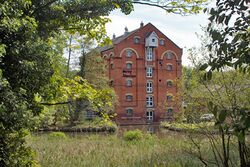History:Stoke Mill, Guildford
| Stoke Mill | |
|---|---|
 | |
| Type | Watermill |
| Location | Guildford |
| Coordinates | [ ⚑ ] : 51°14′59″N 0°34′15″W / 51.2498°N 0.5707°W |
| OS grid reference | SU 998 510 |
| Area | Surrey |
| Built | 1879 |
| Owner | Surrey Advertiser Group |
| Lua error in Module:Location_map at line 522: Unable to find the specified location map definition: "Module:Location map/data/Surrey" does not exist. | |
Stoke Mill is a 19th century corn mill on the River Wey that has been converted into offices. It is situated off the Woking Road just north of Guildford town centre. It forms the centrepiece of a small group of buildings that includes the Grade II listed Stoke Mill House.
History
Domesday lists a mill at Stochae on the King's land. About 1635, Sir Richard Weston built the first paper mill in Surrey here. By 1740 it was also used for grinding corn. This was eventually replaced by a single story mill, with three pairs of stones, after the original was destroyed by fire in 1863. Papermaking ceased in 1869.[1] In 1879 a modern five-story brick built corn mill was constructed alongside and the older mill became a store.[2] In 1894 the new mill was converted to metal rollers to grind the corn and a water turbine had replaced the waterwheel by 1915.[3] The mill ceased working in 1957. After a period of commercial use as a store and boatyard,[1] the building was converted to offices in 1989 and is now occupied by the Surrey Advertiser Group.[2]
Millers
- The first known tenant was John Russel in 1740
- Jasper Franks was tenant in 1842
- John Holden was miller until 1847
- H Saunders held the lease from 1850 to 1855.
- Taken over by Frederick and Henry Bowyer, whose family ran the mill until 1938.[1]
References
- ↑ 1.0 1.1 1.2 Stidder, Derek (1990). The Watermills of Surrey. Buckingham: Barracuda Books. p. 87. ISBN 0 86023 480 0.
- ↑ 2.0 2.1 Crocker, Glenys, ed (1991). A Guide to the Industrial Archeology of Surrey. Association for Surrey Archeology. p. 18.
- ↑ Hillier, Jack (1951). Old Surrey Water Mills (First ed.). London: Skeffington and Sons Ltd. p. 109.

